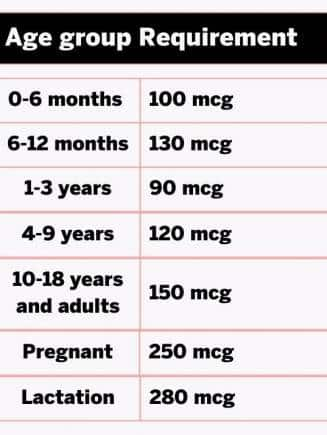



Did you know that iodine deficiency occurs because of soil erosion? Yes, the top soil of the earth has iodine which is absorbed by local produce. Since top soil is getting removed because of environmental changes, we end up getting less iodine in our system. Iodine deficiency leads to malfunctioning of thyroid gland.
When iodine requirements are not met, thyroid gland may not be able to synthesise enough thyroid hormones, namely Triiodothyronine (T3) and Thyroxine (T4). These hormones are important because they help our body use energy, stay warm and keep organs like kidney, liver, heart, brain working properly. Visible symptoms of iodine deficiency include visible lump (goiter) on neck, weight gain, fatigue, thinning hair, dry skin, feeling colder than usual, slow heart rate, learning and memory difficulties.
Most people should be able to get all the iodine they need by eating a varied and balanced diet. Says Padma Shri awardee Dr Chandrakant Sambhaji Pandav, former professor and Head, Center for Community Medicine (CCM), The All India Institute of Medical Sciences (AIIMS), New Delhi, “An average adult should consume 150 micrograms of iodine every day. Pregnant women and lactating mothers need to consume more than an average allowance. Unborn babies till they reach seven years of age also need thyroid hormones for bone and brain development. Iodised salt is the best source for it and it is easy to include in one’s daily diet. There is 15 miligram of iodine per kg in salt at the consumption level.”
Agrees Kalpana Gupta, Clinical Nutritionist at Max Smart Hospital, Saket, New Delhi, “Iodised salts are commonly available in grocery shops. There is 76 mcg of iodine present in ¼ tea spoon of iodised salt. Use of iodised salt ensures adequate iodine intake.”
Says Dr Shikha Nehru Sharma, Founder ONE Health, New Delhi, “Apart from soil erosion, the other reason of iodine deficiency is consumption of junk food and aerated drinks. These kind of processed food items destroy our gut health, leading to less absorption of the minerals from natural sources. Iodine being one of them. Less absorption leads to deficiencies. Tablets given for treatment is not enough as they also contain manufactured hormones and cannot be as effective as the ones produced in our bodies. Certain countries have started iodine fortified food and salt which addresses the daily requirement of iodine intake. It is an acceptable step towards public health but I would suggest that one should try to include natural produce that are good source of iodine in one’s diet.”
Both Dr Pandav and Dr Sharma feel that seaweed is the richest source of iodine. “Seaweed provides highest source of iodine, approximately. 5400 mcg in 100 gm. In Tamil Nadu, and Lakshadweep, it is used in the form of pickle. In India, it is also used as manure for crops,” says Gupta.
But since it is not part of pan Indian palate, here are seven foods recommended by Dr Sharma that are easily available and can be included in our meals:
1. Munakka: A handful of black raisins is enough in a day. It may increase production of thyroid stimulating hormone (TSH).
2. Sweet potato: A bowl/ katori of shakargandi is both delicious and healthy. It has vitamin A that supports thyroid hormone.
3. Pineapple: A few slices or bowl of chopped pineapple has lot vitamins and minerals that help in reducing symptoms of thyroid.
4. Seafood: Try and include cod, tuna, prawns, shrimps, sardines in your diet. Sea food is not only low in calories but also iodine-rich since they absorb it in abundance from sea water. Approximately 100 gms of seafood provide 35 mcg of iodine.
5. Prunes: A handful is excellent vegetarian and vegan source of iodine. Approximately 13 mcg of iodine present in 5 prunes.
6. Eggs: One whole egg twice a week takes care of your body’s requirement of iodine and selenium which help in better functioning of thyroid gland. Iodine is mainly present in its yolk. On an average, one large egg contains 26 mcg of Iodine.
7. Cheese: Consuming 100 gms of paneer or 25 gms of processed cheese can provide you with good fats, calcium and iodine.
“You do not have to consume all of them in one day. Take one food item from the list per day so that you will not feel bored of having the same food every day and your daily requirement of iodine is also met,” suggests Dr Sharma.
 (As per Indian RDA 2020)
(As per Indian RDA 2020)
Discover the latest Business News, Sensex, and Nifty updates. Obtain Personal Finance insights, tax queries, and expert opinions on Moneycontrol or download the Moneycontrol App to stay updated!